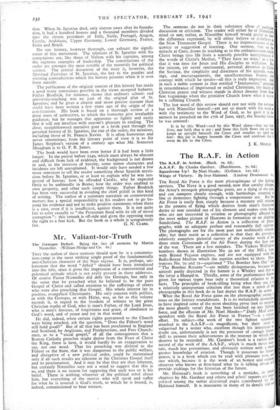Mr. Valiant-for-Truth
The Gestapo Defied. Being the last 28 sermons by Martin Niemoller. (William Hodge and Co. 6s.)
THAT the author of these sermons should now be n a concentra- tion-camp is the most striking single proof of the fundamentally anti-Christian character of the Nazi regime. It is, perhaps, un- fortunate that the word " defied " should have been introduced into the title, since it gives the impression of a controversial and polemical attitude which is not really present in these addresses. Of course Pastor Niemoller did defy the Gestapo, but only in the sense that he preached what he believed to be the pure Gospel of Christ and called attention to the sufferings of others who were also preaching that Gospel. His whole interest lay in positive, evangelical Christianity. His only concern with politics, or with the Gestapo, or with Hitler, was so far as this volume records it, in regard to the freedom of witness to the great Christian truths of God, who is men's Father, of the Lord Jesus, who is men's Saviour, of forgiveness and grace, of obedience to God's word, and of peace and joy in that word.
He did, indeed, when certain rights guaranteed to the Church were being attacked, ask the question, " Does the Fiihrer's word still hold good?" But of all that has been proclaimed in England and Scotland, by Anglicans, and Presbyterians, and Free Church- men, as to a " social gospel," of all the consequences that a Roman Catholic preacher might derive from the Feast of Christ the King, there is here, it would hardly be an exaggeration to say, not one word. That his preaching was disloyal to the Fiihrer or the State, that it was dangerous to the public welfare, and disruptive of a new political order, could be maintained only if all such results are inherent in the Christian Gospel itself and its proclamation. And it may be that they are thus inherent, but certainly Niem011er says not a word to suggest that this is so, and there is no reason for supposing that such was or is his belief. There is nothing whatever of the political rebel about him, but everything of the martyr who will speak and suffer for what he is assured is God's truth, to which he is bound, is, indeed, commissioned to bear witness.
The sermons do not in their substance allow of particular discussion or criticism. The reader will either be of Niemoncea mind or not; rather, as Niemoller himself would prefer to hue the difference expressed, he will either believe or disbelieve k the New Testament Gospel. There is no impressiveness of ein. quence or suggestion of learning. One sermon, that on the miracle at Cana, draws its teaching as to the embarrassment which Christ brings into life from a scarcely possible interpretation td the words of Christ's Mother, " They have no wine," as a hill that it was time for Jesus and His disciples to withdraw. Bu the intense, yet never sentimental, personal devotion to Chris the Saviour, the simplicity and directness of his appeals, warn. ings, and encouragements, the unselfconscious honesty and courage with which he speaks—all this is truly impressive. And in such a noble sermon as that entitled " Intercession," preached in remembrance of imprisoned or exiled Christians, the reality ci Christian prayer and witness stands in direct descent from the* first beginnings when the primitive Church knew what it was to be a suffering Church.
The last word of this review should rest not with the reviewer but with Niemoller himself—yet not so much with his word with the testimony to the Word of God, as he gave it in the sermon he preached on the 27th of June, 1937, the Sunday before he was arrested:
It is by this Word—and by this Word alone—that our fait
lives, our faith that is joy ; and from this faith flows the joy the keeps us upright beneath the Cross and steadies us upon as feet : this joy is happy beneath the Cross and confesses that it owes its life to the Cross.
J. K. Moan.


























 Previous page
Previous page